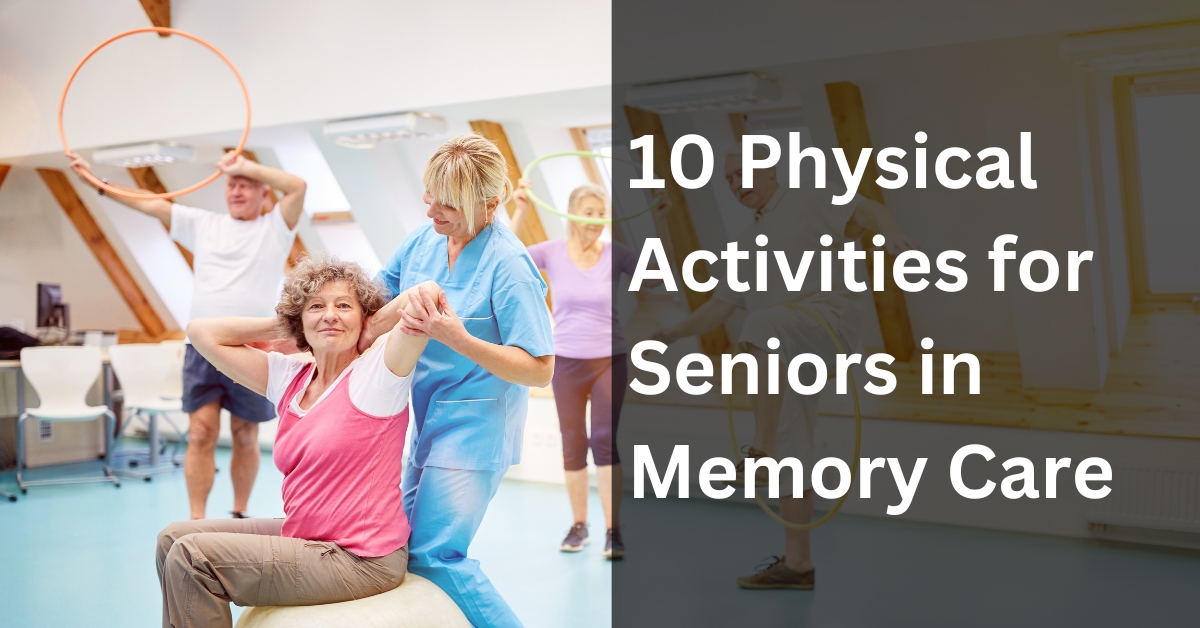As seniors age, especially those in memory care facilities, engaging in physical workouts becomes essential for maintaining their overall health and well-being. Physical exercises tailored for seniors in memory care not only benefit their physical health but also play a crucial role in improving cognitive abilities, emotional well-being, and quality of life. Let’s explore in detail the 10 recommended exercise routines for older adults in memory care.
What Types of Exercises Are Most Beneficial for Seniors With Memory Impairments?
1. Chair Yoga
Chair yoga is a modified form of traditional yoga that can be practiced while sitting on a chair. This gentle form of exercise is suitable for seniors with limited mobility or balance issues. Chair yoga involves a series of seated poses, breathing techniques, and meditation practices that help improve flexibility, strength, and relaxation. The slow and controlled movements in chair yoga promote mindfulness and reduce stress, making it a beneficial activity for seniors in memory care.
2. Walking
Walking is a simple yet effective exercise that can be easily incorporated into the daily routine of seniors in memory care. Taking short walks indoors or outdoors can improve cardiovascular health, strengthen muscles, and boost mood. Walking also promotes social interaction and allows seniors to connect with nature, enhancing their overall well-being.
3. Tai Chi
Tai Chi is a slow and gentle form of exercise that originated in ancient China. It focuses on slow, flowing movements, deep breathing, and meditation. Tai Chi is known for its numerous health benefits, including improved balance, flexibility, and mental focus. For seniors in memory care, Tai Chi can help reduce the risk of falls, enhance coordination, and promote a sense of calm and relaxation.
4. Dance Therapy
Dance therapy involves using dance and movement to promote emotional, cognitive, and physical well-being. Dancing is a fun and engaging exercise that can improve cardiovascular fitness, coordination, and flexibility. For seniors in memory care, dance therapy sessions can uplift spirits, boost self-esteem, and encourage social interaction. Dancing to music from their era can also evoke positive memories and emotions.
5. Resistance Band Exercises
Resistance band exercises are a safe and effective way for seniors in memory care to build strength and improve muscle tone. Resistance bands come in varying levels of resistance, making them suitable for individuals of all fitness levels. These exercises can target specific muscle groups without the need for heavy weights, making them ideal for seniors looking to improve their strength and mobility.
6. Balance Exercises
Balance exercises are crucial for seniors in memory care to prevent falls and enhance stability. Simple activities such as standing on one leg, heel-to-toe walking, or practicing yoga poses that focus on balance can help improve coordination and proprioception. These exercises challenge the body’s balance systems and can contribute to better overall stability and mobility.
7. Swimming
Swimming or water aerobics are excellent low-impact exercises that are gentle on the joints and muscles. Water provides natural resistance, helping seniors build muscle strength and cardiovascular endurance. Swimming is particularly beneficial for seniors with arthritis or other joint pain, as the buoyancy of water reduces stress on the joints while providing a full-body workout.
8. Stretching
Consistent stretching routines are vital for seniors in memory care, aiding in the maintenance of flexibility, reduction of muscle stiffness, and enhancement of posture. Stretching plays a crucial role in elongating muscles, expanding range of motion, and mitigating muscle imbalances. Seniors can derive advantages from gentle stretching exercises that focus on key muscle groups, joints, and tension areas, fostering relaxation and advancing overall physical function. These practices are particularly important considering the causes of dementia.
9. Gardening
Gardening is a therapeutic and rewarding activity that can benefit seniors in memory care both physically and emotionally. Engaging in light gardening tasks such as planting, watering, and weeding can promote physical exercises, improve hand-eye coordination, and enhance cognitive function. Gardening also offers opportunities for sensory stimulation and connection with nature, which can have a calming effect on older adults.
10. Puzzle Games
Participating in puzzle games such as jigsaw puzzles, crossword puzzles, or brain games can help seniors in memory care maintain cognitive function and dexterity. These activities engage the mind, promote problem-solving skills, and enhance memory retention. Puzzle games that involve physical movements, such as reaching, grasping, and manipulating pieces, can also support fine motor skills and hand-eye coordination.
In conclusion
Incorporating a diverse range of physical workouts customized to the requirements and capabilities of seniors in memory care facilities at senior living homes in Frisco, TX, is essential for fostering their physical and mental well-being. These ten suggested activities provide a spectrum of advantages, such as enhancing strength and flexibility, promoting balance, and improving cognitive function. Seeking guidance from healthcare professionals or fitness experts is crucial in devising a tailored exercise regimen.





